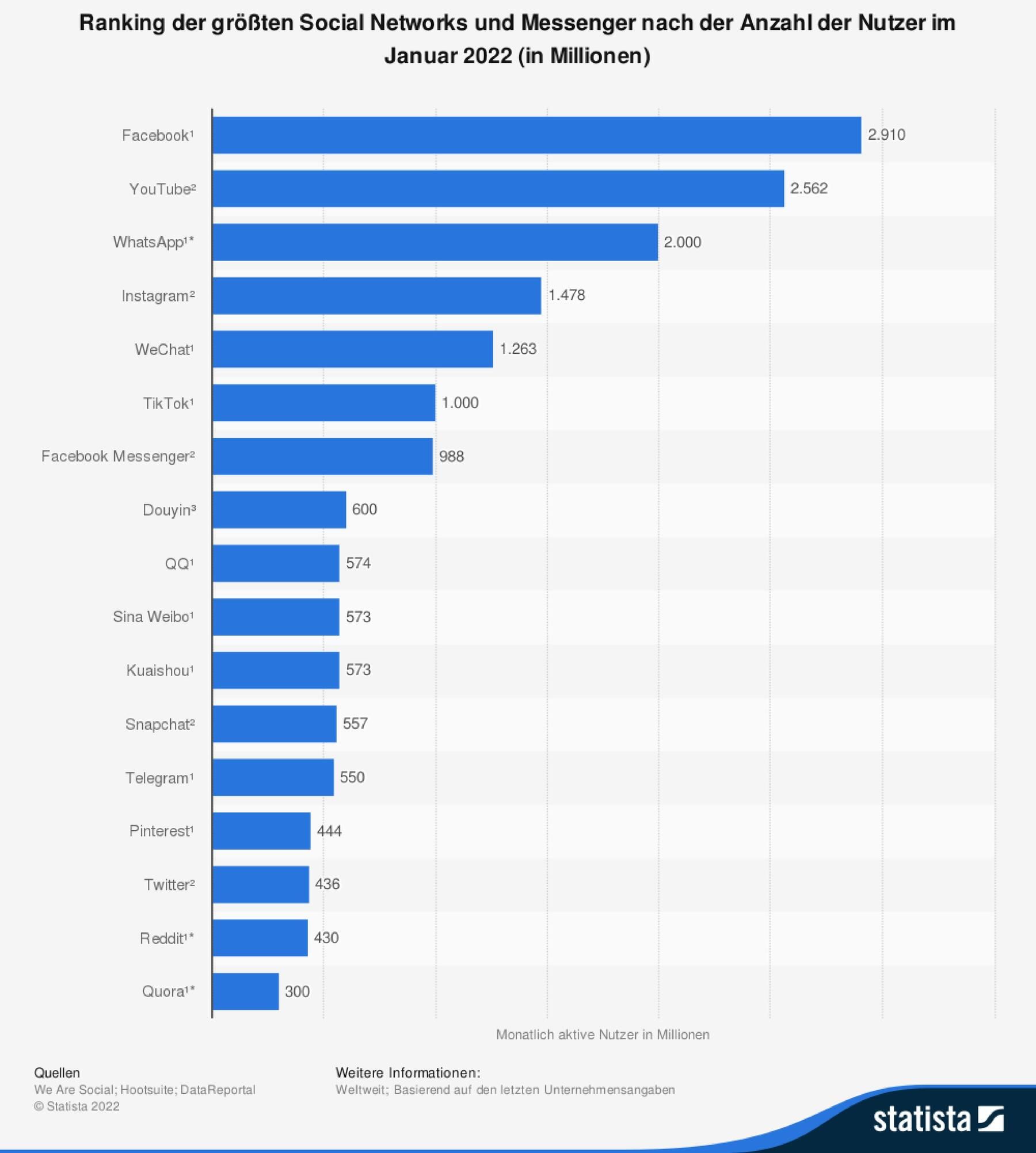Table of contents
- What is Social Media?
- How important is social media for businesses?
- What are the pros and cons of social media for businesses?
- Which social media platforms are relevant for businesses?
- How do businesses establish a good social media presence?
- What make successful social media profiles for businesses?
- What should businesses consider for social media content?
- What social media tools are available for businesses?
- What social media tips are there for businesses?
- Keep an eye on your key figures
- Make your employees corporate influencers
- Develop a real community
Even in 2022, not all small businesses have tackled the subject of social media. According to
Statistics data from 2021 just over 50 percent of companies in Germany are using social media platforms. Many are unsure about utilizing and properly implementing this marketing tool.
Social media offers immense potential for your business - this article gives an overview of what needs to be considered for social media for businesses, as well as fundamental building blocks and tips for your social media presence. Since the topic is extensive, you will find links to exciting articles with further information in the article.
Table of Contents
Social media, also known as social networks or social platforms, are online networks that individuals, as well as businesses, can use for mutual exchange. A
definition from Gabler's economic dictionary for social media reads: "Social media serves for - often profile-based - networking of users and their communication and cooperation over the internet."
A business can set up a public profile in any social medium, similar to a mini-website. This profile is usually referred to as a company page or company profile. You can add publicly accessible and permanent information to this profile, such as your business address or product descriptions. But regular news in the form of posts can also take place.
Customers, prospects, and employees can follow your business profile (hence sometimes called fans or followers) and thereby keep up-to-date.
Users have various reasons why social media are so attractive to them. They can be used for killing time, but also for searching for information and maintaining contacts. For businesses,
social media platforms are primarily important for the presentation of products or services. The associated appeal to customers and applicants also leads to a high degree of transparency and engagement with the community. Additionally, you can use social media for your customer service and significantly simplify and speed this up.
Especially due to the Corona pandemic and the lack of events and direct contact with customers, the importance of online marketing becomes evident and that
social media marketing could be a good starting point for you. It cannot be said in general terms that every business must necessarily use all social media platforms. Rather, you must evaluate how important the development and use of social media is specifically for your business - this is always situation-dependent.
If you are, for example, acquiring enough customers and new employees with other marketing tools, the effort for five social media channels at the same time is not worth it - after all, the channels not only have to be created, but also filled with content. However, at least one social media presence in addition to your website is always recommended.
If you consider the pros and cons of social media, you quickly realize that the advantages clearly outweigh. With comparatively little effort and cost, the acquisition of customers and employees can be supported. Additionally, social media is a big plus for
search engine optimization (SEO): Besides the website, there are other channels via which your business can be found online.
A disadvantage of social media is that it makes you more publicly vulnerable. On a homepage, by phone or email, only "invisible" complaints come in, if at all. On social media, a fail or the like can quickly lead to a shitstorm - and this is publicly visible. The rule here is: Stay calm and carefully consider how to resolve conflicts quickly and effectively.
Recommended social media software
On our comparison platform OMR Reviews you can find more recommended social media software.
We present over 100 solutions that are perfectly tailored to the needs of SMEs, start-ups and large corporations. Our platform supports you in all areas of social media management. Take the opportunity to compare different software and consult real user reviews to find the ideal solution for your requirements:

Overview of social media channels for businesses
There are a wide variety of social media channels for businesses, all of which have different purposes and are structured differently. New platforms regularly enter the market, some of which establish themselves, some of which also go under, such as the network
"Clubhouse" that emerged in 2021.
The most famous social media platforms are
- Facebook
- Instagram
- YouTube
- LinkedIn
- XING (in Germany)
- Twitter
- Snapchat, and
- TikTok
Depending on the product or service and B2B or B2C marketing, various social media platforms are suitable. Facebook and Instagram are mainly important for B2C marketing and are therefore commonly used. Besides Instagram, there are other image and video-based platforms, like YouTube, Snapchat, and TikTok.
Don't underestimate YouTube, especially if you produce informative or entertaining video content in your business. Twitter is used by businesses and organizations like the police for quick news updates. There are also the so-called career networks, which include XING (nationwide in Germany) and LinkedIn (internationally). These are very suitable for B2B marketing as well as for recruiting new employees. A LinkedIn presence is always sensible, purely from an employer's perspective.

Worldwide use of social media platforms by companies 2022 (Source: Statista) For a further overview of the individual social media platforms, their advertising potentials and usage habits, you can refer to the article about
social media platforms.
Shouldn't you just get started with social media and then see what happens? The answer is: No. The setup of your social media platforms should definitely be approached strategically. A
social media strategy includes questions like: What are the company's objectives in using social media? Which channel should be used for which target group? How do you ensure achieved goals? A competitive analysis can be a small help.
A good social media presence includes branding or design and populating the channel with content. Aesthetics and content are equally important. Moreover, from the beginning, you need a designated person responsible for the channels, who has a basic understanding and a certain degree of media competence. If your channels are successful and require a lot of time and effort, it might be necessary to hire an experienced social media manager.
Here are examples of successful social media profiles for businesses:

LinkedIn profile of ING Germany

LinkedIn profile of Google

Facebook profile of Starbucks

Instagram profile of Deutsche Bahn

Instagram profile of Balea
You can already see, the secret lies in: A nice design with strong colors and high-quality images, and gripping content with added value and/or a high entertainment factor.
What should businesses consider for social media content?
The central point after setting up your social media presence is the
social media content, i.e. the content with which you populate your platform. If you create a channel, it should not just exist, but must be filled with life. The key is: Provide added value (and entertainment) to your target group with your content.
Before you start, you should fundamentally determine your positioning on important topics and set it. Think about how you address your target groups in posts and comments. Remain consistent and respect your corporate identity. For example, the informal "you" may be more appropriate for recruiting employees, but not always so for customers.
Plan your content in a
social media editorial plan, in which important actions, dates, events, etc. are noted. This way, you always maintain an overview of all operations and activities. It is important that you create a good mix of different kinds of content and post types (video, image, documents, etc.).
Use visual material and avoid too much text - a post isn't stopped for the text, but because of the image or video. It is also helpful to have a consistent look (branding) of your posts - create recognition value. Here is an example of a successful Facebook post:

Example Facebook post from felmo
You should also consider the
social media algorithms - for each platform there are tips and tricks on how to achieve the most reach. For example, you have to consider the timing of the post, which should generally be between 10am and 8pm and is mostly read during lunchtime and after work.
Consider legal conditions, such as personality and copyright rights, as well as data protection. Before you post information or images from employees, for example, get their written consent. The same goes for images: Only post those that belong to you or copyright-free images from online stock libraries, like the free platforms
Pixabay and
Pexels. For more choice and quality, there are platforms like
Shutterstock and
Adobestock - however, you do need to pay for the usage of the pictures here.
Copy-posting of content across all social media platforms should be avoided - this is quickly noticed and poses risks of a negative image. Rather, use each platform specifically. Good ways to gain reach are, for example, competitions, prize draws, and high-quality events.
Follow the rule of thumb "less is more": Rather post three times a week with high-quality posts than twice a day with irrelevant content. Once your channels are established, you can look into paid advertising campaigns for your platforms. You can find out how to best achieve this in the article about
successful social media campaigns.
In addition, there are social media tools that can help you with social-media management, analytics, postings or ad placement across multiple platforms. However, you should only use these once your social media strategy and the setup of your platforms are in place.
After setting up your social media presence, you can consider the following social media tips:
Engage your followers!
Like, comment & share - build and strengthen your community. In the article about
best practice community management, you will find exciting tips for your team. Establish a clear procedure for your communication and ideally anticipate the response to your content in advance. Promote your social media channels clearly by placing them, for example, with links on the website and in the email signature. Link business partners during collaborations, employees, and customers to extend your reach.
It's also important to track and analyze your
key figures. These include, for example, the number of followers, interactions (likes, comments, shares), and conversions (actual actions, like submitted applications). Most of this data can be seen on the platforms themselves and for example
Google Analytics can be used for this.

Example: LinkedIn analytics of visitors
Make your employees corporate influencers
An important component of social media for businesses is the assistance of their own employees. The more you involve your employees, the more likely you will achieve your goals. Share the social-media actions and announce important posts. Motivate your employees to participate by, for example, commenting, linking with your company profile or by them contributing their own content ideas.
This should be a voluntary offer, because not everyone is social-media-savvy and active on all platforms. It is advisable to set up guidelines for your employees. This facilitates the participation in the social media presence and ensures that your corporate identity is maintained.
Don't buy followers. With this, you might reach a higher number on the screen, but you want a community that honestly and actually interacts with you. Bought followers are also obvious when the interactions are lacking. They only worsen your image and the trust of your target group(s).
The most crucial tip: Look at what other businesses do. Getting inspiration is allowed, copying isn't. Have fun starting with the topic of social media for businesses - better late than never!


